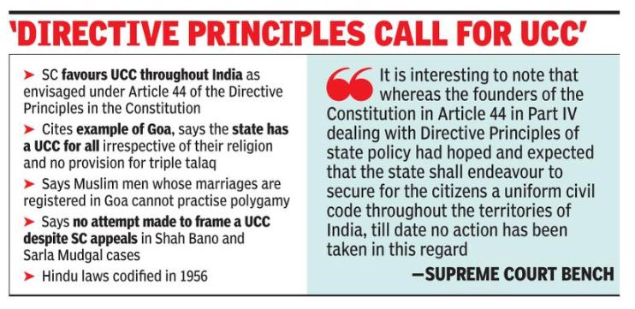Context
-
Recently, Gujarat Home Minister announced the formation of a committee to implement a uniform civil code (UCC) in the state.
-
In May this year, Uttarakhand announced a committee led by retired Supreme Court judge to carry out a similar exercise. Assam and Himachal Pradesh, too have supported the idea of a UCC.
-
What would a Uniform Civil Code mean in India?
- A UCC would provide for one law for the entire country, applicable to all religious communities in their personal matters such as marriage, divorce, inheritance, adoption, etc.

- Article 44 of the Indian constitution says, “The state shall endeavour to secure a Uniform Civil Code for the citizens throughout the territory of India.”
- Article 44 is one of the Directive Principles of State Policy, described in Part IV of the Constitution.
- According to Article 37, “The provisions contained in this Part shall not be enforceable by any court, but the principles therein laid down are nevertheless fundamental in the governance of the country and it shall be the duty of the State to apply these principles in making laws.”
- Part IV (Articles 36-51) covers a wide range of principles, including (apart from the UCC), the securing of equal justice and free legal aid to citizens (Art 39A), participation of workers in the management of industries (Art 43A), organisation of agriculture and animal husbandry (Art 48), protection and improvement of the environment and safeguarding of forests and wildlife (Art 48A), promotion of international peace and security (Art 51), etc.
What is the relationship between Fundamental Rights and Directive Principles?
- The Directive Principles of State Policy follow the Fundamental Rights (Part III, Arts 12-35) in the Constitution.
- The Fundamental Rights lie at the heart of the Constitution, and are justiciable that is, they are legally enforceable in a court of law.
- In its landmark Minerva Mills judgment (1980), the Supreme Court held: “Indian Constitution is founded on the bed-rock of the balance between Parts III (Fundamental Rights) and IV (Directive Principles). To give absolute primacy to one over the other is to disturb the harmony of the Constitution.”
- Article 31C says that if a law is made to implement any of the Directive Principles, it cannot be challenged on the ground of being violative of the Fundamental Rights under Articles 14 and 19.
So currently, is there no ‘uniformity’ in personal law?
- Indian laws are already uniform in most civil matters for example,
- The Indian Contract Act, Civil Procedure Code, Sale of Goods Act, Transfer of Property Act, Partnership Act, Evidence Act, etc.
- However, states have made a large number of amendments, and so, there is diversity even in the secular civil laws in certain aspects.
- Personal laws of religions are diverse in themselves.
- Thus, all Hindus of the country are not governed by one law, nor are all Muslims or all Christians.
- Not only British legal traditions, even those of the Portuguese and the French remain operative in some parts.
- In the Northeast, there are more than 200 tribes with their own varied customary laws.
- The Constitution itself protects local customs in Nagaland. Similar protections are enjoyed by Meghalaya and Mizoram.
- Even reformed Hindu law, in spite of codification, protects customary practices.
Source: IE
Visit Abhiyan PEDIA (One of the Most Followed / Recommended) for UPSC Revisions: Click Here
IAS Abhiyan is now on Telegram: Click on the Below link to Join our Channels to stay Updated
IAS Abhiyan Official: Click Here to Join
For UPSC Mains Value Edition (Facts, Quotes, Best Practices, Case Studies): Click Here to Join
